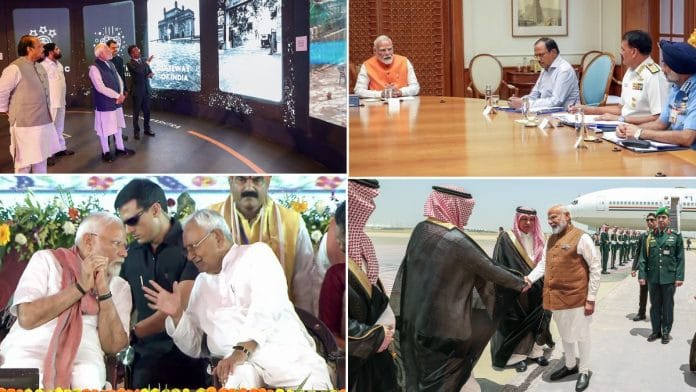New Delhi: Prime Minister Narendra Modi has maintained a business-as-usual public engagement schedule since the Pahalgam attack, with one domestic visit to Bihar and his upcoming visits to three European countries expected to go ahead. This is no different from the days after the Pulwama terror attack in February 2019, when he kept to his schedule as normal.
In the immediate aftermath of the Pahalgam attack, Modi, who was on a two-day visit to Saudi Arabia, cut short his trip to return to New Delhi, cancelling a number of official engagements. This included a dinner on the night of 22 April, the day the attack took place.
He has held two meetings of the Cabinet Committee on Security, including one on 23 April. He also maintained his scheduled visit to Bihar on 24 April, where, at a public meeting, Modi vowed to punish terrorists and their backers “beyond their imagination”.
On 30 April, he announced the caste census ahead of assembly polls in Bihar, inaugurating the World Audio Visual and Entertainment Summit (WAVES) in Mumbai the next day (1 May).
In the coming days, his tri-nation visit to Croatia, Norway and the Netherlands is expected to carry on according to schedule, with the third India-Nordic Summit set to take place in Oslo sometime around 15 May.
The Prime Minister is known for his packed schedule, and that he has kept to such a high number of engagements after a terror attack is also not new. Between the Pulwama terrorist attack on 14 February 2019 and the Balakot air strikes on 26 February 2019, Modi carried out at least seven domestic visits to different states, launching a raft of new government schemes.
A week after the Pulwama attack, he also travelled abroad for his state visit to the Republic of Korea on 21 and 22 February 2019, where he held bilateral talks with then president Moon Jae-in. He was awarded the 2018 Seoul Peace Prize on that trip. Modi also addressed the Indian community in the East Asian country, apart from unveiling the bust of Mahatma Gandhi at the Yonsei University in Seoul.
The international visit took place a week after a vehicle carrying a suicide bomber rammed into a Central Reserve Police Forces (CRPF) convoy in Jammu and Kashmir’s Pulwama, killing 39 personnel and injuring several others. Jaish-e-Mohammed (JeM) claimed responsibility for the attack.
Also Read: Tale of two readouts: Rubio tells Pakistan PM Sharif to cooperate with India on Pahalgam probe
Engagements before Balakot air strikes
A day after the Pulwama attack (15 February 2019), the Prime Minister convened the Cabinet Committee on Security, following which he flagged off the first Vande Bharat Express from the New Delhi Railway Station.
Addressing the gathering before flagging off India’s first semi-high speed train, Modi vowed that the perpetrators of the Pulwama attack will “pay a heavy price” while declaring that the security forces had been given a “free hand” to act.
He laid the foundation stone for several projects in Uttar Pradesh’s Jhansi on 15 February 2019. A day later, the Prime Minister travelled to Maharashtra’s Pandharkawada and Dhule, where he carried out official duties and addressed public gatherings. In his speech at Pandharkawada, Modi once again reiterated that the sacrifices of the CRPF jawans will not “go in vain” and that the security forces had been given a free hand to act.
On 17 February 2019, PM Modi travelled to Bihar and Jharkhand before heading to his constituency of Varanasi two days later, on 19 February 2019, to inaugurate a number of projects. This was followed by his trip to South Korea. On his return to India, he continued his scheduled visits to Rajasthan and Uttar Pradesh. In UP, on 24 February 2019, the Prime Minister launched the PM-KISAN scheme.
All of these activities came less than two days before India’s response to the Pulwama attack, when it launched bombing raids on JeM training camps across the border in the town of Balakot on 26 February 2019.
Similarly, he has maintained his schedule as usual since the attack in Pahalgam, when at least four armed terrorists wielding AK-47s sprayed bullets at tourists in J&K’s Baisaran Valley, killing 26 people.
The attack is one of the most significant against civilians in the Union territory in recent years. In between chairing Cabinet meetings and maintaining a tight domestic schedule, Modi has also spoken to a number of world leaders to build India’s diplomatic case against Pakistan, which it has said has links to the attack, in the last few days.
(Edited by Sanya Mathur)
Also Read: Behind ISI chief’s appointment as NSA, a bid by Pakistan to revive backchannel talks after Pahalgam






